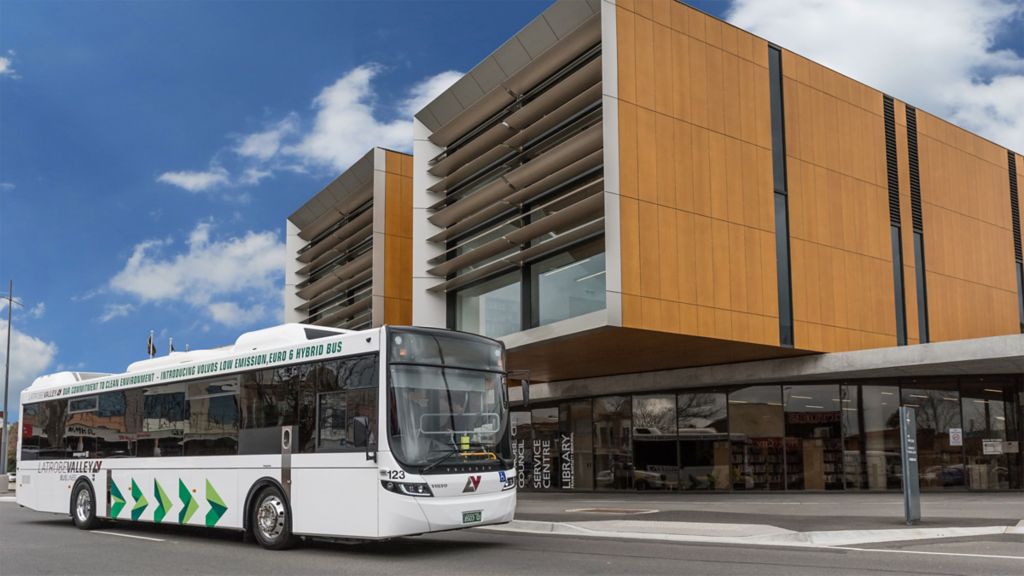LVBL sees Volvo hybrids as a step towards full e-mobility

Volvo Buses
ČESKÁ REPUBLIKA

Latrobe Valley Bus Lines (LVBL) is located in one of Australia’s energy-producing towns, in the Southeastern state of Victoria. The company has maintained a strong long-term focus on sustainability – and reducing emissions is a key priority.
Successful trial with Volvo B5LH S-Charge
After trialing a Volvo B5LH S-Charge Euro 6 route service bus in early 2016, LBVL were impressed with the vehicle performance and invested in eight Volvo B5L S-Charge units, with the first of these buses officially hitting the roads of Victoria in 2018.
“We believe we have a responsibility to our community to reduce our footprint. We like the challenge of using technology that is new and that helps us reduce emissions. The trial of the hybrid was very successful, so we implemented the hybrids across our fleet,” says Anna Tyben, General Manager at Latrobe Valley Bus Lines.
We like the challenge of using technology that is new and that helps us reduce emissions.
Apart from the obvious reduction in tailpipe emissions, the fact that the full hybrid buses also offer other benefits – namely reduced noise and improved passenger comfort – was a much-welcomed bonus for LVBL.
“The Volvo S-Charge buses are very versatile – they have reduced our fuel economy and particulates in the air, they are silent to operate, great for the passengers and extremely good for the drivers. At the end of a long shift, our drivers don’t feel as fatigued,” says Anna Tyben.
Sam Tripodi, bus driver at LVBL, sees many advantages for the Volvo S-Charge.
“I really enjoy driving hybrids; I think they are great buses. They are comfortable, quiet and good for the environment. And they are going to be good for our future for sure,” he says.
Upcoming trial with a Volvo BZL electric bus
As part of LVBL’s environmentally conscious approach to operations and new technologies, the full hybrids are a natural progression from the Euro 6 vehicles and the next-best alternative to electric buses. And at the end of the year, the company will take the next step in their electromobility journey.
LVBL recently announced that they would partner with the Victorian Department of Transport in their three-year Zero Emissions Bus trial (ZEB). From December 2022, a Volvo BZL Electric bus will operate several intra-town and town routes across Latrobe Valley. The bus will be charged efficiently using net renewable power, generated by LVBL’s depot solar panels, and stored by the company’s battery bank.
“We pride ourselves on maintaining an innovative and long-term environmental approach to bus procurement. This trial will provide us a glimpse into the future of public transport,” says Anna Tyben.
As the electromobility movement continues to gain momentum in Australia, hybrid vehicles will still play a key role in a holistic and sustainable approach for the transport industry and companies like LVBL.
“We view hybrids as a step towards full e-mobility. We also strongly believe hybrids would be advantageous across regional and rural operations where updating infrastructure to charge zero-emission buses will be cost inhibitive,” says Anna Tyben.
Next-best alternative to electric buses
Mitch Peden, General Manager Volvo Bus Australia, has closely followed LVBL’s journey from Euro 6 vehicles to full hybrids and the upcoming trial with a Volvo BZL electric bus. He is very happy to see that the company is paving the way forward with clean technology.
“We understand that the large-scale implementation of electric buses will be a progressive journey rather than an overnight transition. Volvo’s B5L S-Charge is the next-best alternative to electric buses. It is an immediately available product that requires no existing charging infrastructure and can deliver part-time electric buses without operational constraints, playing an important role in the journey towards electric transport.”
Established: 1948
Umbrella company: The Dineen Group
Main business: Public transport in Latrobe Valley and Gippsland
Location: Latrobe Valley in southeastern Australia
Volvo buses: 8 eight Volvo B5L S-Charge